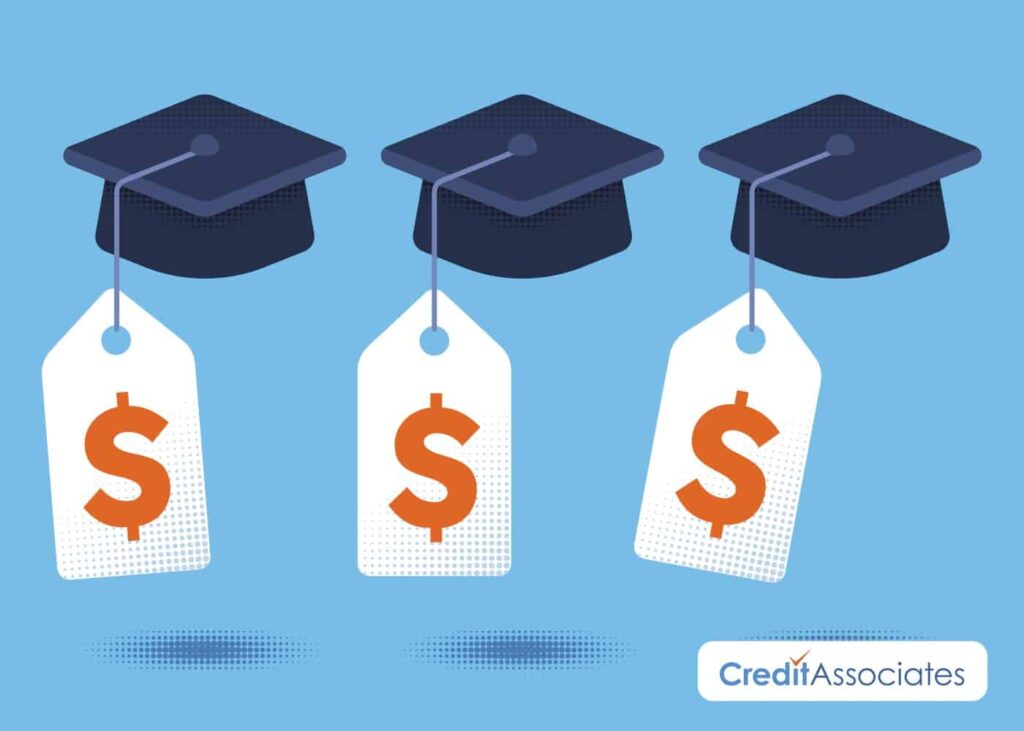Summary
- Student loan refinancing can offer more favorable terms, such as lower interest rates or adjusted repayment durations, aligning with current financial goals.
- A good credit score, often due to responsible post-graduation financial management, can secure better refinancing terms.
- Refinancing decisions should be informed by macroeconomic factors, like interest rate changes influenced by the Federal Reserve.
- Clearly defining refinancing goals, like manageable monthly payments or reduced long-term interest, is crucial in utilizing refinancing effectively.
- CreditAssociates® can help with private student loans and other unsecured debts, reducing what you owe by up to half.
Navigating the maze of student loans can feel daunting. With rising tuition costs and increasing student loan debts, many graduates often find themselves tethered to years of repayments. However, a glimmer of hope is on the horizon: student loan refinancing. This financial strategy offers a fresh perspective and a chance to reevaluate your debt under potentially more favorable terms. Refinancing can be a beacon for those overwhelmed by multiple loans or high interest rates, providing relief and a clearer pathway forward.
Understanding Student Loan Refinancing
What is it?
Student loan refinancing is more than just a financial transaction; it’s a strategic move toward better financial management. It involves taking out a fresh loan, usually from a private lender, to replace and consolidate your existing student loans. The magic lies in the details: this new loan often comes with enhanced terms. These improved conditions might present as a reduced interest rate, altered repayment duration, or even both, aiming to better align with your current financial standing and goals.
Why Consider It?
The journey toward refinancing brings with it many advantages. The most immediate and tangible benefit is the potential for lower interest rates, which can translate into hefty savings over an extended repayment period. Imagine what you could do with that saved amount: a down payment for a home, an investment, or even peace of mind. Beyond the allure of savings, adjusting your repayment terms offers flexibility. Depending on your strategy, you could aim to shorten the loan term, allowing for quicker liberation from debt, or extend it to achieve manageable monthly payments that don’t stretch your budget too thin. This tailored approach ensures your loan works for you, not against you.
Factors to Consider Before Refinancing
Assessing Your Financial Health
A good credit score is at the core of financial health, a trust indicator for lenders. With a robust credit score, you can unlock preferable terms and rates for car and house loans. How do you achieve this? By consistently making timely repayments and judiciously managing your finances. For those who’ve been financially prudent post-graduation, there’s a good chance that your credit score reflects this positive behavior, positioning you well for refinancing.
Understanding the Economic Landscape
Refinancing doesn’t operate in a vacuum. It’s intertwined with the broader economic setting, particularly interest rates, which fluctuate periodically. Factors such as monetary policy shifts, influenced by entities like the Federal Reserve, can usher in rate changes. By staying informed about these macroeconomic movements, you can discern the most opportune moments to refinance, maximizing benefits.
Clarifying Your Long-term Goals
Lastly, and perhaps most importantly, think about your goal. Refinancing is a tool; like any tool, its efficacy is determined by the user’s intent. Are you aiming for more manageable monthly payments, thereby enhancing cash flow? Or, is your vision set on the long game, where you desire to reduce the total interest over your loan’s life span? You can tailor your refinancing approach to best serve your financial aspirations by pinpointing your goals.
Navigating the Student Loan Refinancing Process
Understanding the Journey
Embarking on the student loan refinancing journey can seem like a trek through unfamiliar terrain, but it becomes an empowering expedition with the right map and compass. First and foremost, remember you’re not alone in this journey; many have taken this path to better their financial futures.
Surveying Lender Options
Start by acquainting yourself with the vast landscape of lenders. Each offers a unique blend of interest rates, repayment terms, and potential perks. Take a moment to compare and contrast these options; the perfect fit for your financial goals is out there.
Initiating the Application Process
Once you’ve pinpointed your lender of choice, the application process begins. Think of it as a mutual introduction; you’ll present details about your financial health, and, in turn, the lender will showcase what they can offer. Be prepared with information about your income, employment, and educational background.
Transitioning to Repayment
You will begin the critical repayment phase once your refinancing is approved and the green light shines. It’s essential to stay informed and proactive during this stage. Remember, each payment you make is not just fulfilling an obligation but is a positive step toward your financial empowerment.
CreditAssociates is Here to Help
Ready to reshape your financial future? Let us guide you on the path to financial freedom. Reach out to our experienced team at CreditAssociates today, and together, we’ll build a strategy tailored just for you. Don’t let debt define you—take the first step toward a brighter, debt-free tomorrow.
Common Questions
How does refinancing differ from federal student loan consolidation?
Federal loan consolidation combines multiple federal loans into a single federal loan, often without changing the average interest rate. Conversely, refinancing involves obtaining a new loan, typically from a private lender, with better terms or a lower interest rate.
Will I lose federal loan benefits if I refinance?
Yes. Suppose you refinance federal loans with a private lender. In that case, you’ll no longer be eligible for federal benefits such as income-driven repayment plans, loan forgiveness programs, and deferment or forbearance options.
What factors do lenders consider when determining my refinancing eligibility and interest rate?
When determining eligibility and setting interest rates, lenders typically consider your credit score, income, employment history, educational background, and debt-to-income ratio.
